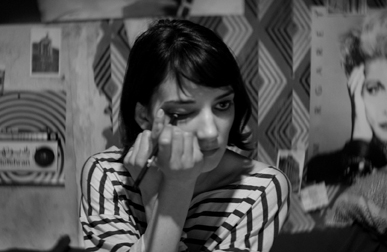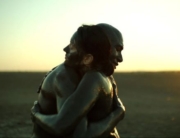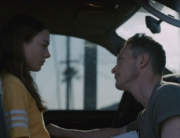A chador-wearing vampire stalks the sleazy men of an Iranian/Western ghost town, while a James Dean look-alike yearns for a better life, and when the two meet, passion sparks. Though this sounds like a recipe for a movie chock-full of drama and thrills, the result of this self-conscious genre mishmash is far more tepid.
Bad City is a town where life is cheap and crime dominates. Arash (Arash Marandi, whose chiseled good looks are the very embodiment of disaffected youth) works days as a handyman for a rich family while his heroin-addicted father incurs debts for dealer-cum-pimp Saeed (Dominic Rains), a tattooed, tracksuit-wearing thug who fairly oozes sleaze (think Jersey Shore’s Situation meets Scarface’s Tony Montana). On the nighttime streets, a vampire, known only as the Girl (Sheila Vand), is watching, menacing the males of Bad City before returning home to an apartment centered on her record player and plastered with pop icon posters. Rounding out the cast of—mostly stock types—are a street urchin (Milad Eghbali), a beautiful but hardened prostitute Atti (Mozhan Marno), and gorgeous, privileged rich girl Shayday (Rome Shadanloo).
When a night enhanced by ecstasy leads Arash to the Girl, the two quickly fall for each other, though the Girl holds back, unwilling to divulge her secrets. Initially, she’s a wonderfully intriguing character, simultaneously attracting viewers and evoking dread. Though this is no horror flick, there are several creepy scenes where Vand truly shines (including a terrifying one in which she menaces the Street Urchin and another that beats 2007’s Teeth for best visual metaphor for castration).
The pop culture–savvy Amirpour knows her stuff, and she also touches upon a well-trod trope: the seemingly innocent monster (see Claudia in Interview with the Vampire and Eli in Let the Right One In). Scenes of the Girl at home, listening to music and playing music, give us an altogether different look at her. Without her chador and with her bobbed dark hair, youthful physique, and penchant for heavy eye makeup, she seems vulnerable, reminiscent of an ’80s/early ’90s Winona Ryder
In a departure from more typical vampire stories, Amirpour provides no backstory for the Girl (who turned her? what are her motivations?) or even any idea of what the rules are for creatures of the night. Apart from tonelessly warning love-struck Arash that she’s done bad things, the Girl lacks the ambivalence that creates dramatic tension in similar movies. Despite the strong set-up, viewers may eventually find themselves wishing for more depth—or even the predictable angst of Anne Rice and Stephenie Meyer, who manage to serve up entertainment along with self-indulgent immortal turmoil.
The issues with the character of the Girl extend to the film as a whole—its charms are all surface. The film is visually stunning, and Amirpour makes expert use of light and shadow. However, her artfully framed shots feel static, like comic book panels (fittingly, Amirpour will releases a graphic novel that further explores the world sketched out in the film). She’s put effort into her world-building, filling Bad City with Iranian features as well as details more common to Western films and some straight-up bizarre touches (a landfill of corpses) and a soundtrack of Iranian pop, but she neglects to imbue the town with a genuinely disturbing tone. Though we’re told it’s imperative for everyone to leave Bad City, we never feel any urgency. Further, these characters aren’t flesh and blood; they’re more like dolls in a beautifully crafted setting. Their interactions seem hollow, such as Arash’s anger for his father, who gambles away their money, or even his love for the Girl, which comes out of nowhere.
There’s still something promising about A Girl Walks Home Alone at Night. Amirpour knows the language of cinema, and she has a unique perspective. With a stronger storyline, her film could have truly shone. While Amirpour hasn’t quite immersed audiences in her world, she’s certainly whet their appetites, and she’s one to watch.







Leave A Comment